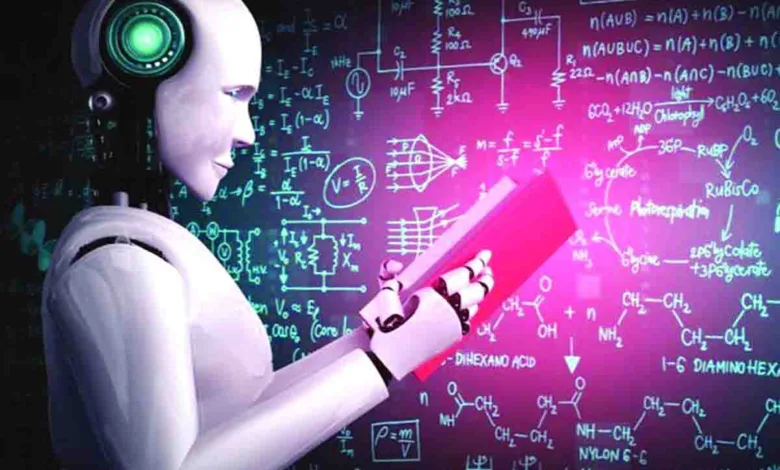AI literacy in school education

Monday, 15 May 2023 | Onkar Singh
GUEST COLUMN
 Onkar Singh
Onkar Singh
Since its inception in 1956, Artificial intelligence (AI) -which was perceived as engineering science for developing intelligent machines- and its applications have grown beyond the original perception. AI has evolved for offering solutions to various problems via natural language processing, neural network and machine learning in the domains like manufacturing, process automation, medicine, education, science, public life, transportation, literature searching, decision making, etc. Among these, the AI interventions in the education sector can potentially help educators to assess the performance and learning levels of students, selecting and recommending learning resources, and intelligent systems for self-oriented learning by the students. While from the student’s point of view, the understanding of AI culminates in the prudent utilisation of support systems based on this technology and mitigating the adverse impact, if any.
It’s worth noting that for quite some time, the monetisation of AI techniques through AI-enabled automated toys, robots, processes, services, etc. has been exposing students to the enriching experience to learn and interact with automated systems. The young children of Generation alpha and Generation Z cohorts are seen deftly handling automated systems, smart devices, robotic toys and services with a lot of inquisitiveness and interest. Though they are unable to figure out the technology at the back of these AI products they are exploring their full potential and appreciating their features. The AI applications in different forms are manifesting into cognitive support, social support, virtual teacher, and learning partners for young children, especially at a time when either of the parents is unable to spend quality time with their children due to their workplace compulsions. Quite likely, these leave certain imprints on young minds and the technological limitations, impacts, and adversities coming alongside affect the growth of the child.
The advanced computer programming skills for AI were previously restricted to the higher education system but the paradigm shift in introducing programming and other related skills in the school education system has opened new horizons for the school children to learn and explore AI. Artificial intelligence is no more confined to the computer science literates, rather it has emerged as a philosophy that holds relevance for all literates and appears as a must for all school children starting from primary levels and non-computer science students at higher education levels for maximizing its usage as a technological support system.
Undoubtedly, there may be counter-arguments to early AI literacy being important for young children to improve many aspects of child development, such as the theory of mind skills, creative inquiry, emotional inquiry and collaborative inquiry. Early childhood education (ECE) necessitates an appropriately designed AI literacy framework with well-laid instructional methodology, tools, and assessment techniques. The framework needs to have concepts, practices, and perspectives on artificial intelligence. For accomplishing the goal of making children understand the basic functions of AI, application techniques and strategies, and attitude and temperamental make-up in problem-solving, it should be engrained in ECE. Besides, the teachers ought to have knowledge, skills, and confidence in AI systems. The curriculum need to be designed for the same and teaching guidelines be prescribed for nurturing a healthy AI literate society.
At the same time, researchers should design a friendly and adaptable AI curriculum for ECE with a primary focus on knowledge, processes, relevance, and impact of artificial intelligence along with well-crafted teacher-student interaction protocols. Interesting AI activities can be innovatively devised for captivating children for their holistic understanding as a science-based training-centric phenomenon that emulates some human-like capabilities, nevertheless, it can’t replace human beings. An effective road map comprising technological, pedagogical, knowledge content, and practice-based interventions will help in the effective integration of AI literacy with the school classroom sessions. Furthering, the use of AI-based quantitative and qualitative assessment protocols for the best possible learning outcomes will strengthen the teaching-learning-evaluation processes and also empower children in analyzing the AI potential.
It’s worth noting that for quite some time, the monetisation of AI techniques through AI-enabled automated toys, robots, processes, services, etc. has been exposing students to the enriching experience to learn and interact with automated systems. The young children of Generation alpha and Generation Z cohorts are seen deftly handling automated systems, smart devices, robotic toys and services with a lot of inquisitiveness and interest. Though they are unable to figure out the technology at the back of these AI products they are exploring their full potential and appreciating their features.
The availability of natural language processing-based conversational generative AI chatbots embedded with supervised and reinforced continuous learning capabilities like ChatGPT, Bard, Jasper, etc. have already started impacting the cognitive thinking of human beings. The fast penetration of machine-assisted writing, problem-solving, decision making and controls in almost all walks of life call for ensuring a reasonable degree of AI literacy in children through school education for its optimal utilization. Else the facilitation in life and studies may inculcate a misconception about the technology and the incorrect output from technology tools based on a misunderstood inputs may be disastrous along with the loss of ingenuity. This makes it imperative to educate the students about the science behind artificial intelligence, its limitations, capabilities, and ethical concerns that may evolve while using AI tools. AI literacy is essential in the 21st century when digital literacy skills are considered ubiquitous. It will empower people for critical evaluation, communication, and collaboration with manmade AI tools instead of treating them as the ones with divine abilities. It will eventually end up in improving multiple aspects of children’s development such as mental skills, creativity, emotional inquisitiveness, and collaborative skills.
Going by the envisaged AI intrusion in all domains, it is well timed to strategize for inculcating AI literacy in early childhood education by overcoming the challenges of the inadequacy of teaching human resources with AI knowledge and skills, embedding curriculum with requisite content for developing AI concepts and understanding, populating the AI-powered toys, robots, processes, and products for engaging young children for hand-on experiences. Enriching the school education system with a stimulating and effective AI literacy eco-system will help in rolling out AI literate. These AI and IT literate children will carve out their professional spaces in all domains of engineering, technology, science, medicine, biology, pharmacy, etc. It will also help in combating the ensuing threat of the majority of students opting primarily for computer centric courses in higher education leading to a huge competency gap in the rest of the domains.
(The author is the vice chancellor of Veer Madho Singh Bhandari Uttarakhand Technical University, Dehradun. Views expressed are personal)






